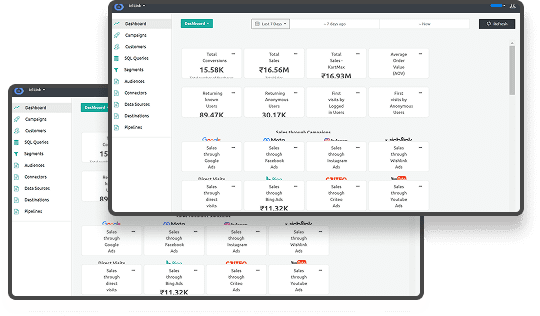TL;DR
- Data integrity keeps your data accurate and reliable for better decisions and campaigns.
- Five key types prevent data storage, access, or linkage issues: entity, referential, domain, user-defined, and physical integrity.
- Data integrity differs from data quality and security; all are essential for trustworthy analytics and operations.
- Common threats include human error, system failures, and data migration issues. Safeguards like access control, validation, and real-time QA help protect your insights.
Did you know that nearly three-quarters of business leaders believe their data isn’t good enough to support competitive growth?
When foundational information lacks consistency or accuracy, everything from campaign planning to performance analysis starts to unravel. As reported 73% of executives report dissatisfaction with their data quality, and 61% admit they struggle to turn data into a business advantage. These numbers point to a deeper issue: decisions are being made on datasets that can’t be trusted. For teams relying on audience segmentation, channel attribution, or real-time optimization, even small inconsistencies snowball into wasted effort and missed targets.
What is Data Integrity?
Data integrity refers to the overall completeness, accuracy, and consistency of data throughout its lifecycle. Good data management ensures that all decisions derived from this data are valid, influencing everything from consumer behavior analysis to marketing strategy adjustments and sales forecasts.
It means that your data is always reliable and can be used effectively to make business decisions. For digital marketers, high data integrity isn't just beneficial; it's essential for crafting targeted, relevant marketing campaigns that truly engage customers and drive conversions.
Why Does Data Integrity Matter?
Data integrity is critical because it directly affects the accuracy, trustworthiness, and value of your marketing efforts:
- Precise Targeting: When your data is clean and consistent, you can segment audiences accurately and serve relevant content based on actual user behavior rather than flawed assumptions.
- Credible Analytics: High-integrity data ensures that performance metrics, attribution models, and conversion analyses reflect actual outcomes, supporting confident decision-making.
- Compliance Confidence: With increasing scrutiny under laws such as GDPR and CCPA, maintaining data integrity reduces the risk of violations, fines, and reputational damage.
- User Trust: Customers are more likely to trust brands that handle their data responsibly. Reliable, consent-based data collection strengthens your credibility and customer relationships.
- Campaign Efficiency: Accurate data helps identify what’s working and what’s not, enabling more intelligent budget allocation, reduced ad waste, and higher ROI.
Let’s explore the different types of data integrity and why each is vital to your operations.
Types of Data Integrity
Maintaining high data integrity ensures that every dataset you use, whether for customer segmentation, analytics, or personalization, is accurate, consistent, and usable. The five primary types of data integrity address different risks and safeguards, making them foundational to reliable marketing operations.
1 Entity Integrity
Entity integrity guarantees that each record in a database is uniquely identifiable. This is typically enforced through the use of primary keys, which prevent duplication and ensure that each row represents a distinct data point.
In digital marketing, this is particularly important when building customer profiles. For example, if a user appears multiple times in your database under different identifiers, segmentation efforts will be flawed, leading to misdirected campaigns and inaccurate performance metrics. Entity integrity ensures your campaigns target real, individual users without overlap or duplication.
2 Referential Integrity
Referential integrity maintains logical consistency between related data tables. If a record in one table is linked to data in another, referential integrity ensures those links are preserved, even when changes occur. If a parent record is deleted or modified, corresponding child records are updated accordingly.
This is essential in environments where data spans across multiple systems, such as customer journeys tracked across email platforms, CRM systems, and ad networks. Without referential integrity, actions such as deleting a user profile may leave orphaned data in other systems, resulting in reporting errors or campaign mismatches.
2. Domain Integrity
Domain integrity restricts the type, format, and range of values that can be stored in a database field. For instance, a field labeled “Email” should only accept correctly formatted email addresses; a “Budget” field may require numeric values within a specific range.
When domain integrity is enforced, it prevents insufficient data from entering your systems in the first place. In practice, this reduces the risk of broken automation rules, inaccurate dashboards, or failed integrations due to incompatible field values. It’s especially critical in campaign automation, where a single invalid value can cause entire workflows to misfire.
3 User-Defined Integrity
User-defined integrity involves custom rules or constraints established by your business to enforce specific conditions that exceed standard database rules. These rules are tailored to reflect real operational needs, like preventing campaigns from being launched unless budgets are approved or limiting how frequently a user can be retargeted.
This layer of integrity offers flexibility and control. It enables teams to identify operational or compliance issues that general data rules may overlook. For example, marketers can configure alerts when campaign performance thresholds are breached or when incoming data falls outside expected norms.
4 Physical Integrity
Physical integrity focuses on protecting data from physical failures, like system crashes, hardware degradation, or natural disasters. Even the most accurate data is useless if it's lost or inaccessible.
To preserve physical integrity, businesses implement measures like data backups, disaster recovery protocols, and storing copies of critical data across multiple regions or systems. This is essential for marketing teams relying on historical data for attribution modeling, LTV calculations, or long-term strategy development. Without these protections, a single technical failure could erase years of valuable insights.
Ingest Labs offers solutions, including comprehensive tag management and real-time data streaming, which help maintain data integrity across various forms, ensuring marketers have access to timely and accurate data for informed decision-making.
With this in mind, let's explore the key differences between data integrity, data quality, and data security.
Data integrity v/s Data quality v/s data security
These three concepts, data integrity, data quality, and data security, are often used interchangeably, but they serve distinct functions in a data-driven environment. Understanding their differences is essential for building systems that are both reliable and compliant. Here's a comparison table for better understanding:
| Aspect | Data Integrity | Data Quality | Data Security |
| Definition | Ensures data remains accurate, consistent, and uncorrupted throughout its lifecycle. | Measures how complete, accurate, timely, and relevant data is for decision-making. | Protects data from unauthorized access, breaches, or malicious threats. |
| Primary Focus | Structure, consistency, and correctness of stored and transferred data. | Fitness of data for use in analytics, reporting, or operational processes. | Confidentiality, integrity (in the security sense), and availability of data. |
| Key Risks Prevented | Data corruption, duplication, loss of consistency across systems. | Misleading insights, inaccurate reporting, wasted campaign efforts. | Data breaches, unauthorized modifications, theft or misuse of data. |
| Methods/Practices | Referential and entity integrity rules, validation checks, controlled updates. | Data cleansing, enrichment, validation, standardization routines. | Encryption, access controls, firewalls, monitoring systems. |
| Role in Compliance | Supports audit accuracy and regulatory traceability. | Ensures regulatory reports are based on reliable, actionable data. | Helps meet legal requirements for data protection and privacy (e.g., GDPR, CCPA). |
| Outcome if Ignored | Inaccurate data pipelines, broken relationships between data points. | Poor decisions, flawed targeting, reduced ROI from marketing efforts. | Legal penalties, customer distrust, reputational damage. |
Ingest Labs serves as a centralized command center to enforce integrity, enhance data quality, and maintain security, particularly in a post-cookie, privacy-driven environment. Through real-time tag monitoring, server-side orchestration, and advanced consent management, it provides the control and visibility marketing teams need to trust their data.
Now, let's examine the potential risks that could compromise your data.
What Are Some Data Integrity Risks?
Digital marketing data is vulnerable to various threats that can compromise its integrity:
- Human Error: Accidental data entry mistakes or improper handling can lead to significant data discrepancies. Implementing proactive monitoring strategies can help detect and correct errors before they escalate.
Louis Saro on LinkedIn has said: “Human errors can also result from lack of training, unclear instructions, or poor data quality standards. Human errors can affect the #accuracy, completeness, and #consistency of the data and lead to incorrect or #misleading results, wasted resources, or legal issues.”
- Cyber Attacks: Malicious activities, such as hacking, phishing, and malware, can alter or destroy data. Ensuring robust security measures and ethical data collection practices can mitigate these risks.
- System Failures: Hardware malfunctions or software bugs can corrupt data. Regular system maintenance and utilizing best tools for tracking digital properties can help prevent and address such issues.
- Data Migration Issues: Transferring data between systems can introduce inconsistencies if not managed carefully. Employing server-side tagging and reliable integration tools can ensure smooth and accurate data migration.
- Regulatory Non-Compliance: Failing to adhere to data protection regulations like GDPR or CCPA can result in data breaches and legal consequences. Understanding consent management and maintaining compliance is essential for safeguarding data integrity.
By recognizing these threats, you can implement effective measures to protect your data and maintain its integrity. For instance, learning how cookieless tracking works and its impact on data collection can offer insights into modern challenges and solutions for maintaining data integrity without relying on traditional tracking methods.
So, how do you keep your data secure and maintain its integrity in a practical sense? Here are some strategies to consider.
Maintaining Data Integrity
To ensure the integrity of your marketing data, consider implementing the following practices:
- Data Governance: Establish and enforce data management policies and standards to maintain quality across the board.
- Quality Control: Regular checks using automated tools can help to catch errors and inconsistencies early on. Employing methods such as validation, parsing, and scrubbing data helps in maintaining its quality.
- Employee Training: Continuous training in best data practices is vital for keeping your team aware of the importance of data accuracy and the consequences of data breaches.
- Access Controls: Restrict data access to authorized personnel only. Implementing consent management systems ensures that only those with the necessary permissions can modify or access sensitive data.
Ingest Labs offers solutions like server-side tagging and comprehensive tag management systems that help maintain data integrity by minimizing dependencies on vulnerable client-side processes.
In addition to these strategies, understanding the importance of data integrity in compliance and security is essential. Let's examine its significance in more detail.
Role of Data Integrity in Compliance and Security
Data integrity plays a pivotal role in ensuring compliance with various data protection regulations and enhancing overall security:
- Regulatory Compliance: Laws like GDPR, CCPA, and Brazil’s LGPD mandate strict guidelines for data handling and protection. Maintaining data integrity ensures that your data practices comply with these regulations, avoiding hefty fines and legal repercussions. Learn more about LGPD compliance in Canada and GDPR rules for staying compliant.
- Data Security: Ensuring data integrity involves implementing robust security measures to protect against unauthorized access and breaches. Third-party cookie restrictions highlight the importance of securing data in a cookieless world.
- Audit Readiness: Regularly maintaining data integrity ensures that you are always prepared for audits. Comprehensive consent management and data handling practices make the audit process smoother and more efficient.
- Risk Management: Identifying and mitigating risks related to data integrity helps in preventing data breaches and ensuring business continuity.
Incorporating data integrity into your compliance and security strategies not only protects your business but also enhances your reputation as a trustworthy and reliable entity in the market.
Also read: How Ethical Data Collection Builds Trust and Fuels Business Growth.
Now, let’s see how data integrity is put into action in everyday business scenarios.
Data Integrity in Practice
Maintaining data integrity directly affects how confidently businesses can act on their data. Here are two real-world scenarios showing how integrity drives better outcomes and how Ingest Labs helps ensure it.
Scenario 1: Retail Brand Using CRM & Analytics
A retail business utilizes CRM systems and marketing automation to execute targeted email campaigns. But without strict data integrity, it faces:
- Duplicate profiles that lead to over-messaging customers
- Inaccurate purchase histories that distort recommendations
- Poor attribution due to mismatched IDs across systems
By implementing advanced data validation and tag governance through Ingest Labs’ Tag Manager, the brand ensures that every interaction is tracked, validated, and properly linked. Using Entity Integrity and Referential Integrity principles built into Ingest IQ and Ingest ID, customer profiles remain accurate across sessions and devices.
Ingest Labs tools used:
- Tag Manager with live debugging to prevent tracking errors
- Ingest ID for identity resolution across web and mobile
- Real-time data QA for maintaining profile consistency
Scenario 2: E-commerce Brand Tracking Cross-Channel Journeys
An e-commerce company wants to track and optimize user journeys across ads, websites, and apps. Without strong data controls:
- Tag fires are missed on slower networks
- Cookies are blocked, creating data gaps
- Mobile behavior is siloed from web interactions
By shifting to server-side tagging via Ingest IQ, the brand reduces browser dependency and unifies all interaction data across all channels. Real-time alerts help detect broken tags instantly, while Data Streaming ensures analytics platforms get consistent, timestamped events.
Ingest Labs tools used:
- Server-side tag orchestration for all tracking pixels
- SDK-based mobile tagging with deep link attribution
- Event IQ for custom behavior tracking across touchpoints
Final Thoughts
Maintaining data integrity improves understanding of your audience, campaign relevance, and business decisions. Inconsistencies or data loss weakens your ability to deliver results, ensure compliance, or scale customer experiences. From controls to safeguards, reinforcing data integrity turns data into a reliable asset. Ingest Labs offers tools to make this control practical.
With real-time tag monitoring, server-side orchestration through Ingest IQ, identity resolution via Ingest ID, and robust data governance capabilities, the platform acts as a single source of truth for marketing teams. Whether you're cleaning up CRM records, managing cross-device tracking, or ensuring tags fire consistently across networks, Ingest Labs’ privacy-first infrastructure and no-code setup give you the visibility and control to keep your data accurate, compliant, and campaign-ready.
Ready to take your data management to the next level? Contact us now and discover how Ingest Labs can help you achieve data integrity and business success.
FAQ
1 What is the difference between data integrity and data quality?
Data integrity ensures consistency and accuracy over time, while data quality measures how useful, complete, and timely the data is for its intended purpose.
2 Why is data integrity important in marketing?
It helps avoid targeting errors, ensures reliable analytics, and supports compliant, trusted user experiences.
3 How can data integrity be compromised?
Common causes include human error, system failures, poor data migration, and lack of validation rules across tools and platforms.
4 Is data integrity necessary if we already have strong data security?
Yes; security protects access, but integrity ensures that the data itself remains correct and consistent throughout its lifecycle.
5 What are some practical ways to maintain data integrity on a daily basis?
Utilize validation rules, schedule regular audits, restrict access to sensitive data, and maintain consistent formats across systems to prevent data mismatches or duplication.






